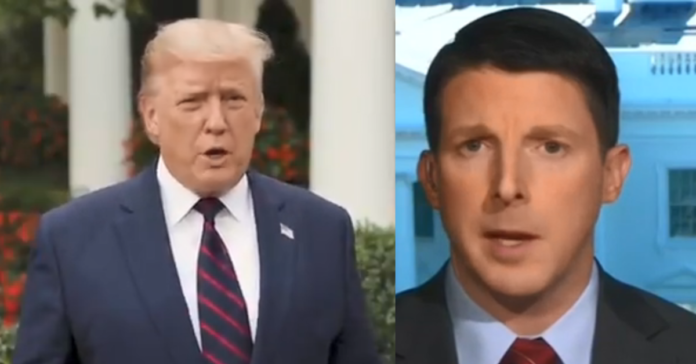A writer at the New Republic thinks he broke the biggest mystery in Washington D.C wide open and he just may be correct.
The author, like many reporters, has been sleuthing out the big White House leaker responsible for the infamous oped article in the New York Times and now the new book warning America about Trump.
The anonymous author claims he/she is or was inside the belly of the beats and speaks with direct knowledge of the events they describe.
The author correctly points to the last time Washington was gripped with such drama – when Primary Colors was released during the Clinton years.
Joe Klein was eventually outed as the author of the book that detailed Clinton’s scandals and the New Republic reporter, David Kusnet, claims he called Steinas the author using the same reasoning as he does in calling out former James Mattis Aide Guy Snodgrass as anonymous.
From The New Republic:
And as with Klein’s focus on New York as the central setting for Primary Colors, A Warning centers on what Snodgrass would know best, national security and foreign policy issues, while frequently praising Mattis and John McCain. Intriguingly, Anonymous admits he had some differences with McCain, while Snodgrass explains what those differences were: As chair of the Senate Armed Services Committee, McCain reamed out Mattis for supposedly failing to brief him adequately.
Even more tellingly, Anonymous addresses speechwriters’ specialties—the process of briefing public officials on complex issues and the impact of presidents’ words on Americans’ attitudes—while reverently describing a visit to a speechwriters’ shrine: the shelves in the White House library reserved for bound volumes of presidential papers. One of his original anecdotes would be especially appalling to a speechwriter: Trump apparently forbids staff to take notes at meetings with him. For linguistics mavens with a penchant for forensic analysis, the op-ed uses several words, “lodestar” and “not moored,” that would be familiar to pilots with a literary bent. And Snodgrass shares the same literary agency—Javelin—with Anonymous.
Reading Snodgrass’s Pentagon memoir, Holding the Line, the clues to Anonymous’s identity are apparent. As in A Warning, the sentences and paragraphs are pithy and punchy. Every chapter in both books begins with an inspiring but not cliched quotation from an historic figure. Many passages in both books are remarkably similar: the ordeal of conducting a Pentagon briefing for Trump; national security staffers exchanging appalled asides about Trump’s conduct of foreign policy via Twitter; and the arguments for why American alliances strengthen national security and immigration policy shouldn’t be based on building a border wall. In particular, both books stress that, when briefed about international alliances, Trump derails discussions by griping about how allies are stiffing the United States, from allegedly miserly NATO contributions to ostensibly one-sided trade policies.
In another revealing quirk, Snodgrass shares Anonymous’s penchant for categorizing his cast of characters. Thus, the op-ed distinguishes between the “Deep State” that Trump denounces, the “Steady State” that Anonymous praises and the liberal “Resistance” from which he distances himself. Toward the end of A Warning, the author divides Trump’s staff into the Lackeys (true believers), the Steady Staters (capable colleagues) and the Abettors (who neither support nor subvert Trump’s worst goals). He divides the last group, in turn, into the Apologists (who “often display a telltale trait: smiling and nodding at the wrong time”) and the Silent Abettors (who keep quiet but, as he acknowledges, may include some secret, surviving Steady Staters). Similarly, in Holding the Line, Snodgrass classifies two kinds of senior leaders around Mattis: “attenuators” who took his bad moods in stride and “amplifiers” who passed along his harshest criticisms, unfiltered, to their subordinates.
Most important, the two books tell the same story, and Snodgrass is a gifted story-teller. In Holding the Line (a metaphor for service members defending the country but also for Steady Staters defending the Constitution), Snodgrass describes how Mattis worked together with “the adults”—Secretary of State Rex Tillerson, White House Chief of Staff John Kelly, economic adviser Gary Cohn, and National Security adviser H. R. McMaster (who sometimes rubbed Mattis the wrong way)—to defend mainstream defense, diplomatic and economic policies against Trump’s inchoate impulses. When the adults are overruled and eventually ousted, Snodgrass realizes Trump is irredeemable.
This @newrepublic piece posits that former Mattis aide Guy Snodgrass is "Anonymous." I sent the article to Snodgrass, who texted back, "Fun." When I pressed him on whether it was true, he replied, "No comment at this time." https://t.co/yHDClvhjRw
— Dan Spinelli (@danspinelli902) November 25, 2019




